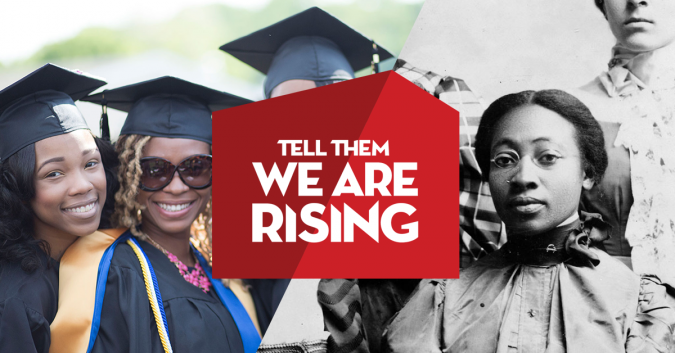HBCU Chicago Football Classic Corner
 Playing to a sold-out crowd twice, Firelight Films’ Tell Them We Are Rising: The Story of Black Colleges and Universities blew into town for the Black Harvest Film festival, leaving Chicagoans beaming with pride and anxious to get the word out about the documentary highlighting the history of Historically Black Colleges and Universities (HBCU).
Playing to a sold-out crowd twice, Firelight Films’ Tell Them We Are Rising: The Story of Black Colleges and Universities blew into town for the Black Harvest Film festival, leaving Chicagoans beaming with pride and anxious to get the word out about the documentary highlighting the history of Historically Black Colleges and Universities (HBCU).
From a current Morehouse College sophomore to proud HBCU alumni and even those who did not attend an HBCU, the sold-out crowds crammed into the Gene Siskel Film Center last week to partake in a history lesson that left them wanting more. Quotes from W.E.B Dubois, James Baldwin, Booker T. Washington and more poured out as black and white images of young co-eds graced the screen. The pictures of Black colleges from Louisiana to South Carolina and beyond filled the big screen as the audience was invited to travel as far back as slavery, when reading and learning were forbidden. Award-winning filmmaker Stanley Nelson (Freedom Riders, The Black Panthers and The Murder of Emmitt Till) masterfully sets the stage, showing how the inability to learn as slaves fueled the passion for education for freed slaves and put into motion the need for Black colleges and universities. The film showed how many abolitionists and churches began the schools to educate freed Blacks, and it exposed the politics and policies that often kept students and their institutions enslaved to the White standards of thinking.

The historic battle between Washington and Dubois concerning Black people’s “place” was outlined and brought to new life, with startling quotes from Washington and Dubois. You could hear the gasps in the audience as Washington’s words of submission boomed from the speakers and ricocheted off the hearts and minds of today’s modern African American.
The documentary also told the backstory behind the late Supreme Court Judge Thurgood Marshall, who attended a new and reformed Howard University Law School, run by a Black president who made some controversial moves to shift the law school. The president set the stage for Marshall’s career and the historic Brown vs. Board of Education case, which challenged the separate but equal law. The politics behind this story are also alarming yet expose the beauty of the Black mind at work.
Tell Them We Are Rising ingeniously chronicled the evolution of thinking and how students at HBCUS joined the front lines of protests for equal rights. It showed the bloody details and the consequences of fighting, interviewing surviving protest leaders, several who were visibly shaken as they reminisced about the protests nearly 50 years later. And the film concluded in the present day, interviewing current HBCU students about their reason for choosing HBCUs, especially now that Blacks can attend other universities.
It was refreshing to hear young sisters talk about the freedom to be themselves, to enjoy time in a setting where they no longer had to worry about being considered a minority or the only Black student. Young men explained how they were allowed to grow and mature under the watchful eyes of Black professors, who they knew had their best interests in mind. With the sometimes bad news coming out of HBCUs because of a lack of funding and declining enrollment, it was great to hear the fresh voices with good news and hope for our schools.
Nelson, whose parents attended HBCUS and who is noted for examining the history and experiences of African Americans, says he wanted to tell the story of these significant institutions—especially since the story had not been told in such a fashion.
In a statement, he says: “The sacrifices made to create these institutions are significant and are what compelled me to capture this essential chapter of American history. I set out to tell a story of Americans who refused to be denied a higher education and—in their resistance—created a set of institutions that would influence and shape the landscape of the country for centuries to come. In particular, it was essential that this film highlight authentic, personal accounts alongside archival footage, letters, diaries, photographs, and even home movies of the people who have lived the HBCU experience. The legacy of these institutions is not marked only by milestones and achievements; it is encapsulated by the minds and lives of the people who walked those storied halls.”
 After the screenings in Chicago, much of the audience stayed around to ask questions of the film’s producer, Cyndee Readden. Many were curious about plans to screen the movie at middle schools, colleges, and even for the returning prison population. The crowd was delighted to hear that the film would air on PBS in February and suggested many other outreach efforts. Readden directed everyone to the film’s website: HBCURising.com and suggested they send their suggestions through the site.
After the screenings in Chicago, much of the audience stayed around to ask questions of the film’s producer, Cyndee Readden. Many were curious about plans to screen the movie at middle schools, colleges, and even for the returning prison population. The crowd was delighted to hear that the film would air on PBS in February and suggested many other outreach efforts. Readden directed everyone to the film’s website: HBCURising.com and suggested they send their suggestions through the site.
Tell Them We Are Rising was directed by Nelson, co-directed by Marco Williams, and produced by Readden and Stacey L. Holman.
The Black Harvest Film Festival runs through August 31 at the Gene Siskel Center. Tell Them We Are Rising premieres on PBS February 19, 2018. The project was created with the help of National Endowment for the Humanities, the Corporation for Public Broadcasting and the Lumina Foundation.

